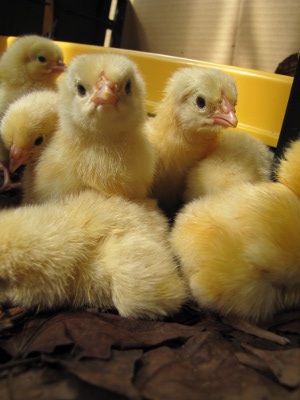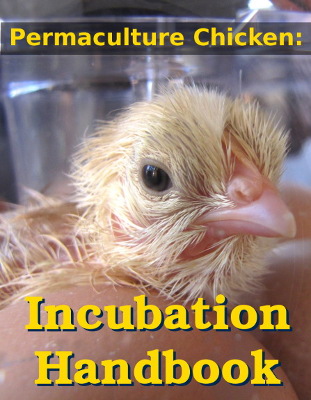
Why incubate?
 While
we'd love our favorite hens to stick around forever, chickens
have a limited shelf life. A hen begins to lay when she's about
six months old, and she does her best work by the time she's a year
and a half old. Depending on how hard-nosed you are, you might
keep your laying hens one year, two years, or three years, but after
that, you're feeding large amounts of grain to an animal who has
basically become a pet.
While
we'd love our favorite hens to stick around forever, chickens
have a limited shelf life. A hen begins to lay when she's about
six months old, and she does her best work by the time she's a year
and a half old. Depending on how hard-nosed you are, you might
keep your laying hens one year, two years, or three years, but after
that, you're feeding large amounts of grain to an animal who has
basically become a pet.
If you want to replace
those old hens who are no longer laying
enough
to pay for their feed, you've got several options. You might be
able to find someone local who is selling point-of-lay hens (pullets
just beginning to churn out eggs). More likely, you'll order
chicks from a hatchery. Or, if you're willing to put in a little
extra effort, you can incubate your own chicks from homegrown eggs.
 Raising new members of your
flock at home has several
advantages, the first of which is that you can incubate as few or as
many eggs as you want. In
contrast, hatchery raised chicks usually require a minimum order of 25
birds to ensure that the
youngsters produce enough body heat to survive two or three days in
a mail truck. Backyard chicken keepers will be hard pressed to
find room for such a large flock.
Raising new members of your
flock at home has several
advantages, the first of which is that you can incubate as few or as
many eggs as you want. In
contrast, hatchery raised chicks usually require a minimum order of 25
birds to ensure that the
youngsters produce enough body heat to survive two or three days in
a mail truck. Backyard chicken keepers will be hard pressed to
find room for such a large flock.
Even more important from
a permaculture point of view is the ability of
the incubating homesteader to tweak the genetics of her flock.
Hatcheries that sell to the general public focus first on breeding
birds well
suited to surviving in a hatchery setting, often aiming for
appearance as
the second priority. If you want to breed a bird that's able to
hunt for its own food, you'll be much happier if you can select your
best birds and raise their young to become your next generation.
 As a final point in favor of
incubating your own chicks, you're the
one in
control of the process from start to finish. You don't risk
diseases from the hatchery or from someone else's farm coming along for
the ride. Your chickens don't have to deal with the trauma of
being shut up in a box or cage for an hour or two days as they make
their way to your farm. And you can start chicks at whatever time
of
the year matches your schedule. Plus, you get to enjoy the
Lifetime Channel version of Chicken TV --- the miracle of new chicks
pushing their way out of their shells.
As a final point in favor of
incubating your own chicks, you're the
one in
control of the process from start to finish. You don't risk
diseases from the hatchery or from someone else's farm coming along for
the ride. Your chickens don't have to deal with the trauma of
being shut up in a box or cage for an hour or two days as they make
their way to your farm. And you can start chicks at whatever time
of
the year matches your schedule. Plus, you get to enjoy the
Lifetime Channel version of Chicken TV --- the miracle of new chicks
pushing their way out of their shells.
This
week's lunchtime series is excerpted from Permaculture
Chicken: Incubation Handbook. I hope you'll splurge 99 cents
to read the whole thing!
 This post is part of our Chicken Incubation lunchtime series.
Read all of the entries: This post is part of our Chicken Incubation lunchtime series.
Read all of the entries: |
Want more in-depth information? Browse through our books.
Or explore more posts by date or by subject.
About us: Anna Hess and Mark Hamilton spent over a decade living self-sufficiently in the mountains of Virginia before moving north to start over from scratch in the foothills of Ohio. They've experimented with permaculture, no-till gardening, trailersteading, home-based microbusinesses and much more, writing about their adventures in both blogs and books.
Want to be notified when new comments are posted on this page? Click on the RSS button after you add a comment to subscribe to the comment feed, or simply check the box beside "email replies to me" while writing your comment.
- Remove comment

- Remove comment
